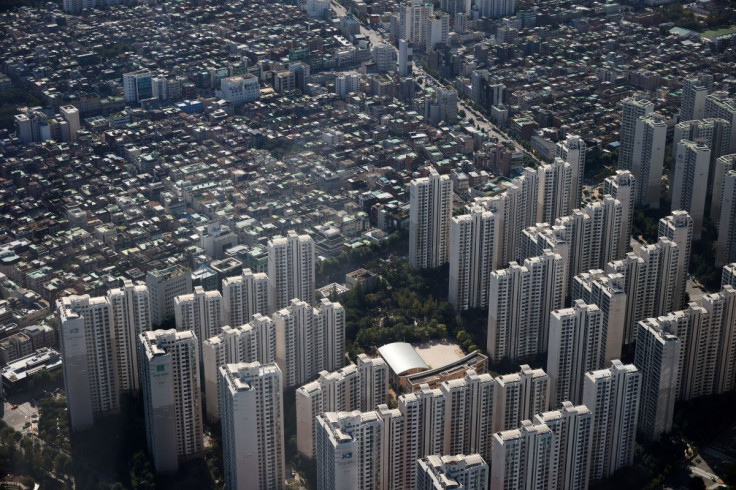Young S.Korean Home Buyers Test Yoon's Vow To Resolve Affordability Crisis

Young South Koreans are buying homes in defiance of sharp rate rises that has once again put the spotlight on a severe housing shortage, complicating President Yoon Suk-yeol's plans to ease a property affordability crisis in Asia's fourth-biggest economy.
Oh Ye-seul, a 26 year-old who works at a start-up firm in Seoul's posh Gangnam district, is the sort of individual who finds little or no sway in Yoon's pledges.
In March, when Yoon swept to power amid anger over his predecessor Moon Jae-in's failures to tame runaway home prices, Oh bought an apartment at a price slightly under 600 million won ($466,236), about half an hour's subway ride from her office.
Such purchases, which an increasing number of young Koreans are pursuing, are being made despite rapid interest rate hikes by the Bank of Korea and suggest the public remain sceptical of Yoon's vow to ease an affordability crisis that has eluded successive administrations.
Moreover, it also raises broader economic implications as mortgage rates have spiked to nine-year highs, adding to strains on households saddled with the world's highest debt loads and a global surge in prices for everything from petrol to food to consumer items.
While much of the buying is being fuelled by the fear of missing out on a property due to soaring prices, the risk down the road is of a sharp housing correction, and consumption downturn.
"The continued snapping up of homes by young people is coming at a time when interest rates are rising fast, so consumption could be hit as many will be forced to cut back on their living expenses," said Park Sung-woo, an economist at DB Financial Investment.
"South Korea's household debt is reaching some dangerous levels, and we need to see a slowdown in homebuying and mortgage growth to ease that risk."
Total debt held by South Korea's households, worth $1.5 trillion or 104% of country's gross domestic product, is higher than any other 35 countries tracked by the Institute of International Finance.
WEALTH CREATOR
For now, though, many young Koreans continue buying property even as the BOK is expected to lift borrowing costs further on top of its 125-bps of rate hikes delivered since August.
Yoon has pledged to relax loan curbs and supplying 2.5 million apartments to ease an acute shortage of property, including loosening loan-to-value (LTV) restrictions from July.
But buyers like Oh, who have pushed up the proportion of Seoul home buyers in their 20s and 30s to 43% in April, up for a second month from 36% in February, are not prepared to wait. In Seoul's central districts of Jongno, Gwanak, and Seongdong, more than half of the buyers were from the age group.
Real estate is one of the biggest wealth creators for South Koreans, with 73% of total household assets invested in property as of 2021, government data showed.
Oh considers herself lucky to have secured a mortgage with a state-run lender that offers cheap, fixed-rate loans to first home buyers.
The poor performance of domestic and global stocks, with the local benchmark KOSPI down 15% year-to-date, has also provided an extra incentive for Koreans to invest in a property.
Oh said she wasn't overly worried about a housing correction, adding "there will be even more demand from first-time buyers for small-sized apartments like my own once borrowing regulations ease."
In fact, a May BOK survey showed South Koreans remained largely optimistic about property prices for the next 12 months.
Such attitudes to home purchases will be a test for Yoon's government, which is trying to tame a red-hot market where average apartment prices have doubled to more than a million dollars in metropolitan Seoul during Moon's five-year term even as household incomes have failed to keep pace.
That has made home ownership unaffordable for many, especially first-home buyers, with data from one of the nation's largest commercial banks KB Bank suggesting it now takes 19 years to buy an average apartment in Seoul for an average wage earner.
For Yoon, the promise to supply millions of apartments is facing practical hurdles, especially as soaring global inflation has sharply lifted construction costs and is slowing down many other planned projects. Moon's administration didn't acknowledge the housing shortage until late in his five-year tenure.
"For President Yoon, it will be tough to restore trust from young people on his policy initiatives, because previous policies caused them to feel left out from property market gains," said Lee Da-eun, an analyst at Daishin Securities.
($1 = 1,286.9000 won)
(Editing by Shri Navaratnam)
© Copyright Thomson Reuters 2024. All rights reserved.




















